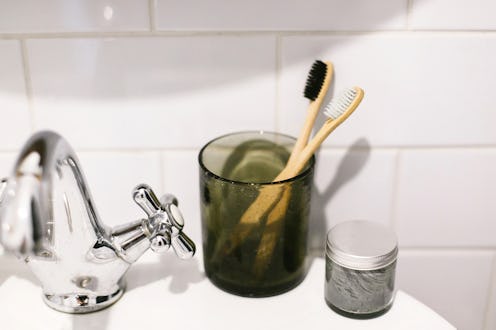Health
Everything You’ve Ever Wanted To Know About Charcoal Toothpaste
The internet loves it. Dentists aren’t fans.

The internet is great for popularizing extremely visual, but dubiously effective trends. Case in point: Charcoal toothpaste videos now have millions of views on TikTok, complete with eerie black foam. While it makes a real mess in your pristine white sink, manufacturers call it the new natural tooth whitener. But does charcoal toothpaste actually work?
“As cool as these pastes appear, there isn’t any evidence to suggest that charcoal-based toothpaste is either safe or effective for our teeth,” Dr. Maha Yakob, PhD, senior director of professional and scientific affairs at oral care company quip, tells Bustle. A review of 118 studies of charcoal toothpastes published in the Journal of the American Dental Association in 2017 found that there’s “insufficient clinical and laboratory data” to show that the black stuff benefits teeth, or that it’s safe to use.
If you see charcoal toothpaste everywhere, including all over your For You page, and are tempted to try it out — if only to freak out your roommates — here’s what you need to know about it.
Charcoal Toothpaste’s Origins
Weirdly, charcoal's tooth-related history goes back centuries. As the BBC reports, ancient Greeks used it to get rid of stains and mask nasty smells from diseased gums. Today's charcoal toothpastes often contain an activated form of the ingredient. Activated charcoal is sometimes used to treat overdoses or severe intoxication, and it is also peddled as a “detox” method by the Instagram crowd.
Charcoal Toothpaste’s Purported Benefits
A review of 50 charcoal toothpastes published in the British Dental Journal in 2019 looked at the health benefits being claimed by their manufacturers. Over half of the 50 toothpastes were advertised as having therapeutic benefits, while 30% said their formula could strengthen teeth. Claims regarding antibacterial, anti-fungal, and detoxifying benefits were also made. But the British Dental Journal review found that none of the claimed health benefits of charcoal toothpaste has any scientific evidence to back it up.
Does Charcoal Toothpaste Work?
“There is no evidence-based research that has found that charcoal toothpaste is effective for whitening, and it may actually harm the teeth and gums,” Dr. Lauren McDonough DMD, vice president of practice support at Aspen Dental, tells Bustle. Using charcoal toothpaste may actually harm teeth because many brand formulas do not contain fluoride, a vital ingredient for warding off tooth decay.
It's the same story when it comes to whitening effects. Although almost all of the toothpastes tested claimed to be able to whiten teeth, the review's authors found that there wasn't enough free radical bleaching agent in the formulas to effectively remove stains.
“These products may actually end up doing more harm than good, since using overly abrasive materials to clean teeth lead to yellowing and weakening the tooth’s structure,” Dr. Yakob says. Charcoal-based products scrub away enamel, she says, exposing the soft yellow tissue underneath and leaving your teeth vulnerable.
The bottom line? Always consult with some kind of expert before changing up your everyday health habits.
Experts:
Dr. Lauren McDonough DMD, vice president of practice support at Aspen Dental
Dr. Maha Yakob, PhD, senior director of professional and scientific affairs at oral care company quip
Studies cited:
Brooks, J. K., Bashirelahi, N., & Reynolds, M. A. (2017). Charcoal and charcoal-based dentifrices: A literature review. Journal of the American Dental Association (1939), 148(9), 661–670. https://doi.org/10.1016/j.adaj.2017.05.001
Greenwall, L. H., Greenwall-Cohen, J., & Wilson, N. (2019). Charcoal-containing dentifrices. British dental journal, 226(9), 697–700. https://doi.org/10.1038/s41415-019-0232-8
This article was originally published on